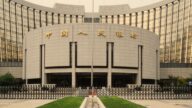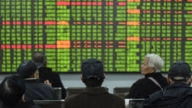【新唐人2014年03月12日讯】在2014刚过去的两个月里,中国的出口急速减少、房地产成交量和价格双双下降。外界认为,拉动中国经济的三驾马车中,两架已经趴下,而作为驱动经济引擎的“投资”则成本过高。今年7.5%的国内生产总值GDP增长目标,只是一个美丽的谎言。
海关总署3月8号公布的数据显示,中国2月出口6965亿2000万元,下降20.4%﹔进口8363亿1000万元,增长7%﹔当月实现贸易逆差1397亿9000万元。
另外,3月10号,人民币对美元中间价大幅低开,人民币即期早盘剧烈波动,盘中跌了将近300个基点,最大跌幅超过0.5% 。降幅达到2012年7月以来的最高水平。
外界普遍认为,是央行在有意压低人民币汇率,来拉动出口。
《央视》财经评论员牛刀:“但是这个东西不是它调的,这是国际市场促成的,这是一个原因。另外一个原因实际上是美元出逃中国,造成人民币贬值,因为好多人卖了房子要换成美元出逃,其他的银行拿不出美元来,就买美元。向央行买美元,就造成了人民币的贬值,中央银行,前面那段时间大贬的时候,还是掏空美元去打压美元的,它是维护人民币升值的,我们在市场上看得清清楚楚。”
3月9号,中共国家统计局公布,2月份,代表消费价格指数的CPI环比上涨0.5%,同比上涨2.0%,而代表工业生产者出厂价格指数的PPI环比下降了0.2%,同比下降2.0% ,PPI已经连续几年下跌。
大陆经济分析师任中道:“现在是天量的货币供应量,因此对国内始终是贬值,它物价始终在上涨,其实是成本在上涨,PPI的工业指数应该和CPI是并行的,它两者一直是背离,实际上是物价始终在上涨,老百姓要承受严重的通货膨胀所带来的资产的损失。”
从资金面看,7天质押回购,国债逆回购,利率都连续下滑了近20天,《央视》财经评论员“牛刀”指出,如此宽松的资金面,商品价格本应上涨,但商品价格自去年12月起就开始连续下跌。这些表明,中国滥发货币已经走到尽头,下游需求严重不足。
另外,央行10号公布的金融数据显示,1、2月新增存款较去年同期大幅减少8339亿元。而同期的房屋成交量也下降50%以上。
牛刀:“老百姓没什么钱,有钱的是一部分的富人,靠一部分富人怎么可能把一个国家的经济拉动呢?这不是荒唐的事吗? 大量的人没钱消费,刚刚有一点钱消费的人,都被房子压死了。共产党是发疯了,天天在土地上摇钱,那土地的钱就是货币的问题,你货币放得越多,你土地价钱就越高嘛。”
3月7号,焦煤、铁矿石和焦炭集体跌停,铁矿石从去年11月的每吨957,跌到每吨780,跌幅达18.5%。
另外,螺纹钢暴跌2.27%,从去年12月的每吨3745,跌到每吨3228,跌幅14.1%。动力煤则从去年12月的每吨600,跌到每吨502,跌幅17%。
不仅中国市场,伦敦金属交易所(LME)3个月基本金属期货,3月7号全面下跌,因为担忧中国大陆经济的影响,其中铜价大跌近4%,创下七个月新低,而铅、锌、锡也都有2%以上跌幅。
那么在市场大跌的情况下,中共今年定下来的7.5% 经济增长率如何实现?
牛刀:“(7.5%的GDP)那都是骗人的,它本来就没有什么7.5的GDP,去年还7.7扯蛋的事情。全部都是做假的,很多人都把它揭穿了,现在在中国来讲,很多工厂、工人工资发不出来,很多人在失业,它还在那里一片叫好,一片虚假的繁荣,没有用的。”
大陆经济分析师任中道指出,在拉动中国经济增长的三大马车中, 国内“消费”很难拉动经济增长,中共企图依靠“投资”去拉动经济,但是现在投入一块钱,只有两、三毛钱的产出。如果依靠“出口”的话,中国市场的竞争力又远远不如东南亚国家。
采访编辑/刘惠 后制/钟元
During the past two months China’s export has
declined rapidly, as has real estate volume and price.
The international community considers that two of the three
factors to push China’s economic growth have declined.
In addition, the cost of investment
that drives economy is too high.
This year, the 7.5% gross domestic product
(GDP) growth target is not reachable.
China’s General Administration of Customs
released new data on March 8, 2014.
China’s February export was 696.52 yuan, down 20.4%.
Import was 836.31 billion yuan, an increase
of 7%, with trade deficit of 139.79 billion yuan.
In addition, the median open price of RMB against the
U.S. dollar was low on March 10, and fell nearly 30 points.
The biggest decline reached more than
0.5%, and is the largest since July 2012.
It is generally believed that the central
bank is intentionally undervaluing the
yuan in an attempt to boost exports.
Du Dao, CCTV financial commentator: “It is not
adjusted, but decided by the international market.
Another reason is that the USD (dollar) is leaving
China, resulting in devaluation of the yuan.
Many people sold their homes and
exchanged their money to dollars.
The banks do not have enough dollars.
They are buying dollars from the central
bank, causing a devaluation of the yuan.
The central bank tries to weaken dollar and appreciate
yuan, even during the time of sharp decline of the yuan.
We see it clearly in the market.”
On March 9, China’s National Bureau
of Statistics announced that the Consumer
Price Index (CPI) rose 0.5% in February.
This is a year on year rise of 2.0%.
The Industrial Producer Price Index (PPI)
decreased 0.2%, with a 2.0% drop year on year.
China’s PPI has declined for several years.
Ren Zhongdao, China economic analyst:
“Now money supply is sky rocketing.
Money is devaluating in China
and prices and costs are rising.
PPI and CPI should be parallel, but these
two are going in the opposite direction.
In fact, the price is increasing. People have to
bear the loss of assets due to severe inflation.”
From the perspective of capital, seven day interest rates
for pledged repurchase and reverse repurchase of national
debt have both have declined for 20 days in a row.
Nu Dao, a China Central Television financial commentator,
suggested commodity prices rise due to relaxed money supply.
Commodity prices should increase, but
have been declining since last December.
This indicate that China’s money supply has come to
an end, suffering a serious shortage for future demand.
In addition, financial data released on March 10 by
the Central Bank indicated a significant reduction of
833.9 billion yuan of new deposits in January and
February, compared with the same months last year.
Housing transactions for the same
period also decreased by 50%.
Nu Dao: “People do not have much money.
Only a small amount of people are rich.
How can the small amount of rich people
help the country’s economy? It is absurd.
Most people do not have money to spend. Those
who do, have a large amount of housing debts.
The Chinese Communist Party (CCP) is crazy.
Every day it shakes the money from the land.
The more money it supplies, the higher the price of land.”
On March 7, coal, iron ore and charcoal all stopped declining.
Iron ore dropped from 957 yuan per ton during
last November to 780 per ton, a decrease of 18.5%
In addition, thread steel plummeted 2.27 percent, from
3,745 yuan per ton last December to 3,228 per ton.
Power coal dropped from 502 yuan per ton
in last December to 600 per ton, down 17%.
In addition to China’s market, three-month
base metals futures in the London Metal
Exchange (LME) dropped on March 7.
due to concerns about China’s economy.
The price of copper fell nearly 4%,
a record low of seven months.
Lead, zinc, tin also declined more than 2%.
With sharp declines in the market, how will the
CCP achieve its goal of a 7.5% GDP increase?
Nu Dao: “It is a lie, and there is
nothing like a 7.5% GDP growth.
The 7.7% GDP growth last year was all
false. Many people exposed this truth.
Many factories in China could not pay workers’
wages, and lots of people are unemployed.
The CCP is still trying to make a false
façade of prosperity, but it is of no use.”
Economic analyst Ren Zhongdao points out that
among the three key factors of China’s economy,
domestic “consumption" is difficult to stimulate growth.
The CCP has tried to rely on
“investment” to stimulate the economy.
But investment of each yuan only has 20 or 30 cents output.
For “Export”, the competitiveness of the Chinese
market is far less than Southeast Asian countries.
Interview & Edit/LiuHui Post-Production/ZhongYuan
























